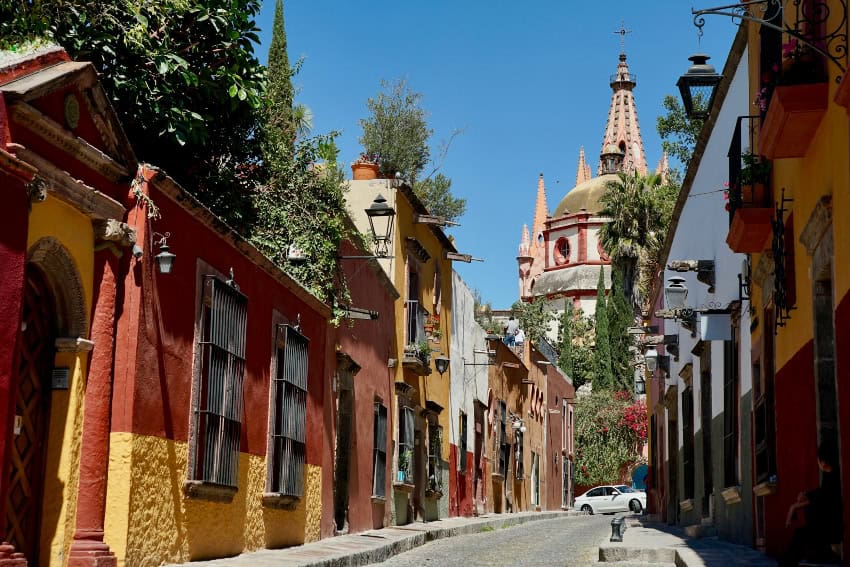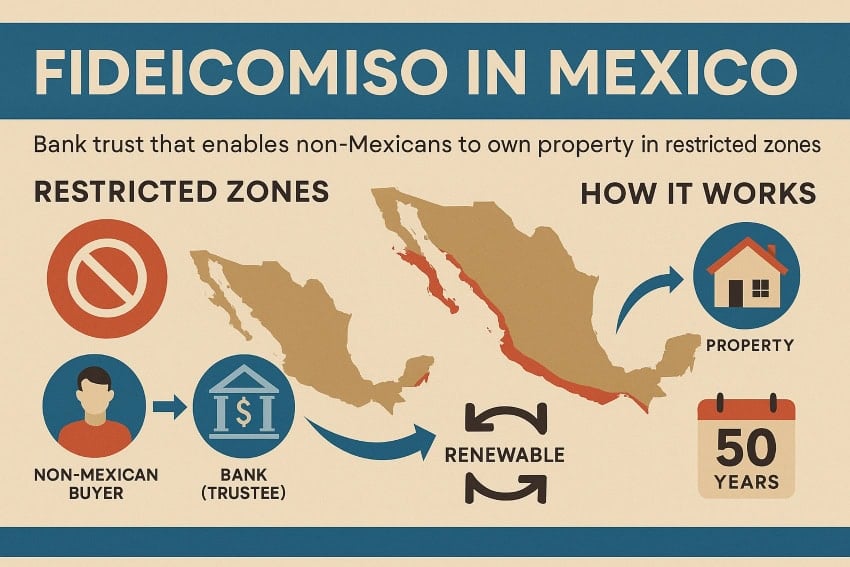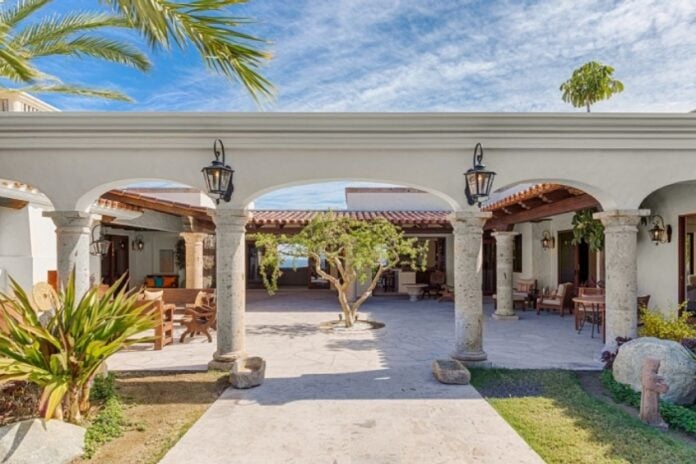Buying a home in Mexico can be a reasonably straightforward process, but it’s not without potential surprises — especially when it comes to closing costs and related expenses.
For many foreign buyers, the final amount they pay at closing ends up higher than expected simply because they didn’t budget for all the details that go into purchasing a home here. Understanding those costs up front can make the process less stressful and help you make better financial decisions.
Closing costs: What to expect

Closing costs are generally higher in Mexico than in the United States and can vary depending on where you buy. In San Miguel de Allende, for example, they typically range between 5% and 6% of the purchase price, but for Querétaro, barely an hour away geographically, the percentages tend to run higher — closer to 8%.
These amounts do not include any loan origination fee a buyer might pay when financing a purchase. For example, if you use a U.S.-style mortgage from a lender specializing in foreign buyers, there may be an origination fee in addition to regular closing costs. That means your total costs could rise to around 8% or 9% of the property’s price.
Buyers are responsible for all closing costs in Mexico, while sellers typically pay the real estate commission. This division of costs is standard practice across the country.
What’s included in closing costs in Mexico for real estate
Closing costs generally cover three main categories:
Acquisition Tax: A government tax charged when a property changes ownership. This is similar to a transfer tax or stamp duty in other countries.
Notary Fees: All real estate transactions in Mexico must be formalized before a notary public (notario público). The notary’s office verifies the title, oversees the legal transfer, collects taxes and registers the sale with the government. Fees vary slightly by notary, but they’re generally consistent within a region.

Legal Fees: Many buyers also pay a lead attorney’s fee, which covers legal review of title documents, due diligence and administrative fees for the attorney’s time in coordinating between the notary, buyer and seller.
These costs are typically bundled into your final statement at closing, so it’s important to review the breakdown carefully. Most notaries and attorneys in a given region follow similar fee structures, so significant variations from the norm should raise a red flag. A competent realtor should be able to give you a good idea of what the norm is for your area.
Negotiating the price
Home prices in Mexico are often negotiable, and your real estate agent can assist you with negotiations. It’s common to see final sale prices come in at 5% (or maybe a little more) below the initial asking price, depending on market conditions, property age and seller motivation.
Working with a local agent who understands the market can help you determine what’s reasonable to offer. While bidding wars are rare in most areas, desirable homes — especially in popular locations — can still attract multiple buyers, so flexibility is key.
Furnished or turnkey homes
One pleasant surprise for many foreign buyers is that homes in Mexico are often sold furnished, or even turnkey, meaning they come fully equipped and ready to move in. “Turnkey” usually means everything is included: furniture, appliances, kitchenware and sometimes even artwork and linens. You might only need to unpack your clothes and toothbrush before settling in.
That can be a real advantage for buyers relocating from abroad, as furnishing and outfitting a home in another country can take time and effort. However, it’s always wise to confirm in writing exactly what’s included. Some sellers remove personal items or heirlooms in a home before closing, so make sure your purchase agreement clearly states what stays with the property.
If you’re buying an unfurnished home — or just want to bring some of your stuff with you — Mexico allows foreigners with a recent visa a one-time permit to import their personal possessions without paying any duties, which means you can also bring items from home with you in the move — even large items like furniture and a car. However, customs agents at the border have complete discretionary authority, so be aware that if they believe any of your items are brand-new, they may insist on charging you import duties on those items.
After the purchase: Property taxes

Once you’ve closed, you’ll encounter another pleasant surprise: Property taxes in Mexico are extremely low compared to the United States, Canada or Europe.
In many cities in Mexico, annual property taxes (known as predial) can often be paid online, and the amounts are modest — sometimes only a few hundred dollars a year, depending on the property value and location. This low tax burden is one reason Mexico continues to attract retirees and second-home buyers from abroad.
Still, it’s important to stay current with your payments. Late fees and penalties can add up over time, and unpaid taxes can complicate future sales.
Fideicomisos: What coastal buyers need to know
If you’re purchasing a home near Mexico’s coastline or within 100 kilometers of a foreign border, you’ll need to establish a fideicomiso — a bank trust that holds the title on your behalf.
Under Mexican law, foreigners cannot directly own property in these restricted zones. However, a fideicomiso gives you full control over the property, including the right to sell, lease or pass it on to heirs, who can easily renew the fideicomiso.
According to Christina Larson of Boardwalk Realty in Puerto Vallarta, one of Mexico’s most active coastal real estate markets, where fideicomisos are required, setting up the trust costs around US $2,000, with annual maintenance fees of about $500. This fideicomiso lasts 50 years and can be renewed for another 50 when it expires.

While it adds another step to the process, Larson explained that a fideicomiso is straightforward once you’ve chosen a bank to administer the trust. It’s a well-established system that thousands of foreign homeowners in Puerto Vallarta and other coastal resort cities use without issue.
Renovation and building costs
For buyers interested in renovating an older home — or building one from scratch — costs in Mexico are generally significantly lower than in other parts of North America and Europe. Labor is more affordable, and materials can often be sourced locally.
In most cases, you’ll work with an architect who has his own construction crew. The key is to find someone reputable who understands both your vision and the local building codes.
Renovation projects in Mexico can be rewarding, particularly if you appreciate the country’s architectural styles and craftsmanship.
Why local expertise matters
Real estate markets in expat enclaves in Mexico have often adjusted themselves to suit attractive foreign buyers, so buying in these places may feel rather familiar — especially to Americans and Canadians. But there are still key differences that make it advisable to work with a knowledgeable local realtor.
A local agent can help you:
1) Understand the true costs of purchase, including taxes and fees.
2) Negotiate effectively in the local market.
3) Coordinate with trusted notaries, attorneys and escrow services.
4) Guide you through cultural and procedural differences that might otherwise cause delays or misunderstandings.

Mexico’s real estate market operates smoothly when all parties know the rules and communicate clearly, but it’s not identical to systems outside the country. Having the right guidance from the start can save time, money and stress.
The bottom line
Buying a home in Mexico remains an appealing and attainable goal for many foreigners, but it’s important to go in with open eyes and a well-planned budget. Between acquisition taxes, notary and legal fees, and possible financing costs, closing can add anywhere from 5% to 10% to the total purchase price.
Factor in these costs from the start, confirm what’s included in your purchase, and rely on an agent you trust to guide you through the process. With the right preparation, owning a home in Mexico can be a rewarding experience and a sound investment.
Glenn Rotton is a real estate agent with eight years of experience in San Miguel de Allende. Originally from Seattle, he has lived in Mexico for twelve years with his husband, Kiang Chong Ovalle, and their dog, Angus. Read more about Glenn here.
